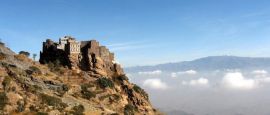Visit the port of Aden with its biblical history and fine museums. Crater, the oldest part of the city, lies in the crater of an extinct volcano and is where the most ancient constructions in Aden may be seen.
Yemen things to see and do
Colourful wooden fishing boats skippered by crews from Yemen, Eritrea and Djibouti fill the harbour of this Red Sea fishing port. A visit to the fragrant and thronging and fish market sees myriad species including shark, swordfish and tuna auctioned fresh off the boat to the highest bidder.
See Amran, lying on the edge of the fertile basin of al-Bawn. The city is surrounded by the old clay city walls of pre-Islamic, Sabean origin.
Shop for souvenirs in Sana'a's 1,000-year-old Bab al-Yemen Market, which is divided into 40 different crafts and trades. The spice market is one of the best to visit. Other markets include the Souk al-Nahaas selling embroidered head-dresses, belts and jambias (curved daggers).
Dive in the balmy Red and Arabian seas, or take to the water for a spot of sailing.
See the Great Mosque of Sana'a, the oldest and largest of the mosques in Sana'a and one of the oldest in the Muslim world, constructed in the lifetime of the Prophet and enlarged in AD705.
Scale Hadda Mountain and take in picturesque villages dotted with orchards growing apricots, peaches, walnuts and almonds.
These central mountains provide one Yemen’s best trekking areas. Guided hikes maybe arranged to take in the larger villages of Manakha, Al Hajjarah and Huytayb along with those barely-visited lost in the Haraz uplands.
Visit the modern Red Sea port of Hodeida and see the fish market, where fishing boats have been built from wood in the same way for hundreds of years.
Lounge on several superb beaches fringing the Indian Ocean at Little Aden, situated in the crater of an extinct volcano; this is an area of small fishing villages in sheltered bays. Hike and camp on Socotra Island; the island's remarkable landscape is home to a huge array of wildlife and plants.
Tour the National Museum in Taherir Square in Dar al-Shukr (Palace of Gratefulness); it contains engravings of pre-Islamic times, bronze statues, a beautiful mashrabia (cooling place for water) and several examples of folk art.
Visit Rawdha, some 8km (5 miles) north of Sana'a, a garden city famous for its sweet grapes, the mosque built by Ahmed ibn al-Qasim and the Rawdha Palace, now used as a hotel.
Tour the walled city of Sa'dah. The al-Hadi Mosque is still an important institution for education in Zaydism. It is possible to walk along the top of the city walls, which offer good views of the city.
Walk amongst Yemen's early crops of grapes in the strikingly fertile Sad'ah Basin.
To see Old Sana’a, drive along the sunken street of the Sailah towards Sana’a’s ancient heart, which for many visitors, is their first and possibly most enduring memory of Yemen. Here the treasure of Sana’a, its characteristic tower houses defines a capital like no other the world over. Other highlights include the Souk al Milh for a shopping experience that's a far cry from the global High Street, and for a street bursting with simple and cheap Yemeni food head to Restaurant Street off Hadda Street.
Even those limited to San’a can still make a full day excursion to its surrounding villages. Head for fortified Kawkaban, the silversmiths of Thula and the famed Hamida restaurant of Shibam.
This walled desert city on the open plain is another architectural gem designated a World Heritage Site by UNESCO. Likened to a ‘Manhattan of the Desert’ by early 20th-century traveller and writer Freya Stark, Shibam’s 500 mud tower houses, some nine stories high, are 500 years old and are home to 5,000 people.
Finally designated as a World Biosphere Reserve in 2008 the remote Socotra archipelago is the Arabian answer to the Galapagos in terms of unique flora and fauna. 700-year-old Dragon’s Blood trees and Socotra Desert Rose set against the Tolkeinesque peaks of the Haggier Mountains characterise a unique lanscape. Undeveloped, unspoilt, with few roads - only 2,000 visitors make landfall each year.
Capital of North Yemen until 1962 this town has a very different feel to Sana’a. Though the ‘old city’ has been all but swallowed up by the fast-growing modernity, beautiful old houses and mosques remain within the line of the 13th-century city wall, still intact along the southern perimeter.
Enjoy the subtropical climate of Wadi Wa'aar, lying between Sana'a and Sa'dah in the north. Out of this rises the Shahara, a huge mountain massif, the highest point being nearly 3,000m (9,840ft) above sea level. This can be climbed by foot or by 4-wheel drive car.
Do you have any Feedback about this page?
© 2026 Columbus Travel Media Ltd. All rights reserved. No part of this site may be reproduced without our written permission, click here for information on Columbus Content Solutions.








 You know where
You know where